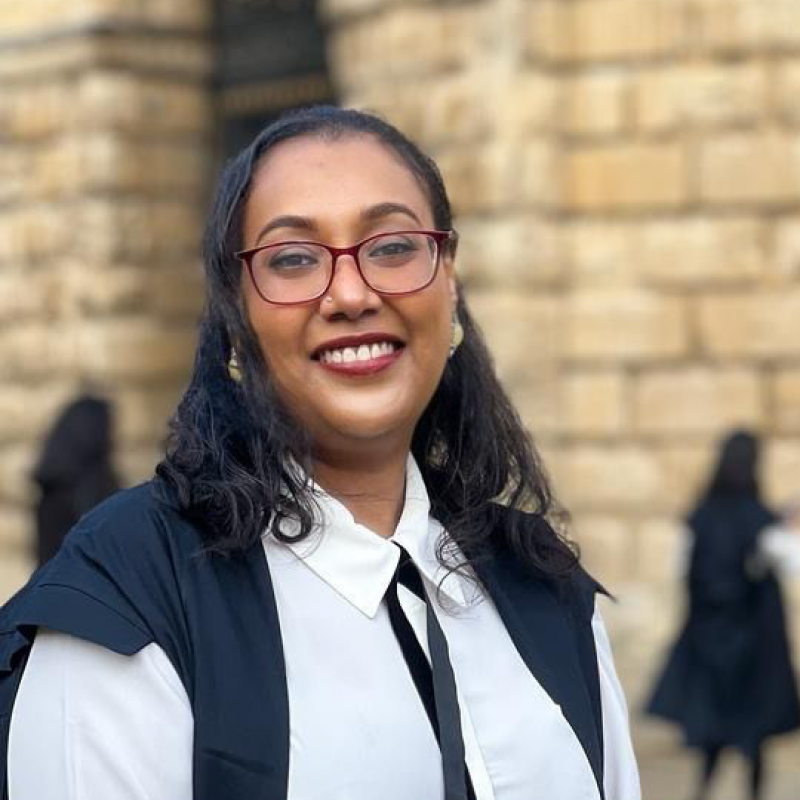Breadcrumb
Before joining the Master of Public Policy (MPP), Fatima Bashir (MPP 2022) had a good idea of what she wanted to do afterwards. Fatima originally qualified as a dentist and spent several years practising in her home country Sudan while also working as a teaching assistant at a Dental School in Khartoum. She was very interested in community health and often supported mobile health clinic initiatives in rural areas of Sudan. This sparked an interest in public health that she has been pursuing ever since.
Fatima undertook her first master’s in public health from Umeå University in Sweden. She then worked on various programmes with UNICEF and UNDP, opening her eyes to the complexities of global health dynamics and how this affected the implementation of health programmes in lower income countries.
“When I was working with these UN organisations, big questions were arising for me about how health financing could work in low-income countries, how could I come to understand the political, legal and economic dynamics at play. I wanted to understand more about this and that desire is what brought me here.”
For Fatima, the MPP stood out because of its professional and multidisciplinary nature which would give her the skills and knowledge she felt she was lacking to effectively implement public and global health programmes. The COVID-19 pandemic brought health questions to the centre of all policy discussions and felt like the ideal moment to learn how to operate within these policy dynamics.
Once Fatima’s application was accepted, the challenge of securing funding for the course was her next step. Fortunately, Fatima was invited to interview for the Mo Ibrahim Scholarship at the Blavatnik School, which supports outstanding Sudanese applicants to the MPP. She remembers she “could hardly sleep with anticipation” when waiting to hear the outcome of her selection interview. She received the news that she’d been successful and began the countdown to starting the course.
Since arriving, Fatima has been enjoying the history of Oxford which has cemented in her the feeling that she is part of a long history of people who have made change.
“Being at the university is an experience in and of itself. Since arriving I’ve had the opportunity to attend webinars, lectures and other events with very prominent leaders. It’s very inspirational. The scholarship has opened these doors for me and broadened my horizons. I’m very grateful to my scholarship for this and for the affiliation it gives me with Mo Ibrahim who does such amazing work on the African continent.”
The MPP course has also opened her eyes to the potential she has to have an impact when thinking more broadly and exploring areas that she hadn’t previously considered.
“When I came here, I had a picture of exactly what I wanted to do, where I wanted to go after this and which organisations I wanted to target. Since coming, I realised that with the MPP I actually have the knowledge and skills to do more. Why am I limiting myself just to the area of health, for example, when I can look at other areas and have an even bigger impact? I don’t have an answer now for what I will do next, but I like that I don’t have an answer.”
The multidisciplinary nature of the MPP course has inspired an interest in the concept of multi-sectoral collaborative policymaking for Fatima. In health in particular she feels there is space to explore how policymakers could work with other sectors to maximise positive outcomes. Essential to this cross-sectoral collaborative style of policy work will also be the soft skills the School helps students to develop while on the course and beyond.
“I want to make the most of the opportunities offered to us at the Blavatnik School. Since the course started, we’ve had access to professional skills sessions on topics such as communication and negotiation skills. These more practical sessions really add to the overall value of the education you’re getting at the School. I intend to take maximum advantage of this while I’m here.”
November 2022.

